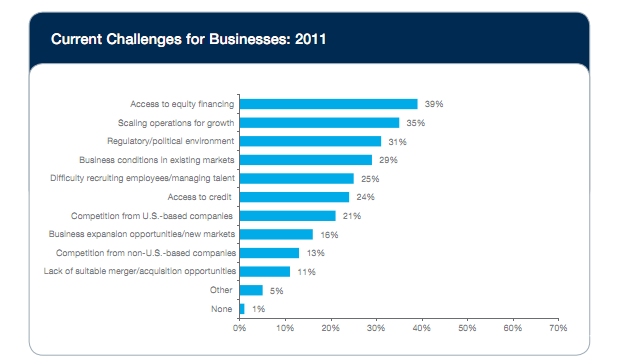
The Initial Pitch
On May 20th Sherwood Neiss, Chief Advocate for The Startup Exemption decided to test the basis for Crowd Fund Investing by pitching the idea to approximately 150 people at Startup Weekend Miami.
Startup Weekend (funded by the Kauffman Foundation – American’s largest Entrepreneurial Foundation) is a 54-hour event that takes place in 100 cities around the world. It is designed to provide superior experiential education for technical and non-technical entrepreneurs. The weekend events that have launched over 2,000 businesses, are centered on action, innovation, and education. Beginning with Friday night pitches and continuing through testing, business model development, and basic prototype creation, Startup Weekends culminate in Sunday night demos to a panel of potential investors, experts and local entrepreneurs.  Participants are challenged with building functional startups during the event and are able to collaborate with like-minded individuals outside of their daily networks.

Friday Night Crowd Voting
There were 60 ideas pitched by the attendees and the crowd voted. Crowd Fund Investing received the 4th highest number of votes. The Top 15 ideas formed teams and started working on their prototypes for the next 50 hours.  Neiss’ team consisted of students; front and back end web developers, and business people. They divided the work into functional groups and by Sunday had a Minimum Value Proposition “MVP†to present to the judges.
Neiss’ presentation began by congratulating to all the finalists with a reminder that while great ideas are sparked at this event, no one would go very far without funding. And that’s where their idea came in. With only 5 minutes to explain and demonstrate their proof of concept, Neiss was able to win over the 5 industry experts and VC judges. Winning comes with a variety of prizes that include a month of free social media support and 3 months of free office space at a Miami incubator.

After Winning Startup Weekend Challenge
Maris McEdwards Community Manager for Startup Weekend Corporate had the following to say, “Startup Weekend’s mission is to empower entrepreneurs to create new and innovative solutions to real-world problems.  We encourage teams to incorporate customer validation and feedback at every stage of development.  Personal experience provided Sherwood years to think about and perfect this funding and investment option for entrepreneurs. Their win at Startup Weekend Miami was not simply due to a great solution; a large part of their success can be attributed to a thorough knowledge of the problem they were tackling. Given the positive response from the Startup Weekend Miami judges and attendees, they have clearly defined entrepreneurs’ needs and are building some serious momentum for Crowd Fund Investing.â€
With 3rd party validation about the business model, Neiss will be using this as further evidence that the time is ripe for the SEC to update the Security Laws to include an exemption based on the framework in The Startup Exemption.






